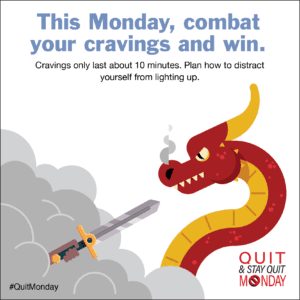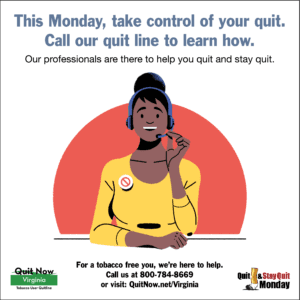“Quit Now West Virginia” Smoking Cessation Program Receives Major Grant Funding
COVID-19 may have distracted us from other major public health issues affecting the lives of Americans, but, today, smoking remains the leading cause of preventable death in the United States. And this fact is especially true for West Virginia, the state with the highest rate of smoking in the country.
To address this continued crisis, West Virginia organizations are refocusing attention to promoting tobacco cessation. The Pallottine Foundation of Huntington earlier this month awarded the Cabell-Huntington Health Department with a $259,933 grant dedicated to reducing smoking rates in nine counties across the state. The Coalition for a Tobacco-Free West Virginia (CTFWV) in collaboration with the Cabell-Huntington Health Department identified the value in the Quit & Stay Quit Monday (QSQM) approach to tobacco cessation and were particularly drawn to the positive, action-oriented messaging. With guidance from the QSQM team, CTFWV have adapted the campaign to help encourage higher quit rates, increase awareness of the West Virginia quitline, and promote the implementation of more tobacco-free worksite policies.
 Juliana Frederick Curry, President CTFWV, had this to say:
Juliana Frederick Curry, President CTFWV, had this to say:
“The Coalition for Tobacco-Free West Virginia is excited to have the opportunity to work with Quit and Stay Quit Monday and The Monday Campaigns to help reduce the burden of tobacco in our state by providing support to help people quit using tobacco products. We strongly feel that through the commitment, plan and partnership with Pallottine Foundation of Huntington, Cabell Huntington Heath Department and WV Tobacco Quitline we can help reduce smoking rates in West Virginia. By supplementing the existing tobacco cessation program in our state with the Quit and Stay Quit Monday materials, we have 52 unique opportunities a year to encourage individuals to quit smoking or recommit to ending their tobacco use every Monday.”
By supplementing the existing tobacco cessation program in our state with the Quit and Stay Quit Monday materials, we have 52 unique opportunities a year to encourage individuals to quit smoking or recommit to ending their tobacco use every Monday.
Juliana Frederick Curry, President CTFWV.
“We are thrilled to offer our free creative materials to support this project along-side the Cabell-Huntington Health Department and Coalition for a Tobacco-Free West Virginia. We have seen a positive impact from applying the QSQM concept in mass-media in other markets and workplace settings. We hope to help engage West Virginians to take steps toward quitting tobacco and reducing the likelihood of developing tobacco related disease,” said Meghan Crowley of The Monday Campaigns.
 The “Quit Now West Virginia” campaign applied the Quit & Stay Quit Monday concept, and designed a multi-pronged approach modeled after prior state-wide QSQM campaigns, like Virginia Department of Health’s program. West Virginia will leverage social media (Facebook, Twitter, Instagram), traditional mass media (billboards), and worksite wellness initiatives (email, posters/print media, website, company social media accounts), in order to reach as many smokers as possible and encourage them to contact the state quitline and/or quit smoking. The Cabell-Huntington Health Department and CTFWV will also promote its 12-week smoking cessation campaign for multiple cohorts, including participants from worksites and other health departments in nine priority counties across the state. Health departments and workplaces that agree to participate will use QSQM materials (co-branded with the quitline number) that will direct smokers to the West Virginia quitline for support.
The “Quit Now West Virginia” campaign applied the Quit & Stay Quit Monday concept, and designed a multi-pronged approach modeled after prior state-wide QSQM campaigns, like Virginia Department of Health’s program. West Virginia will leverage social media (Facebook, Twitter, Instagram), traditional mass media (billboards), and worksite wellness initiatives (email, posters/print media, website, company social media accounts), in order to reach as many smokers as possible and encourage them to contact the state quitline and/or quit smoking. The Cabell-Huntington Health Department and CTFWV will also promote its 12-week smoking cessation campaign for multiple cohorts, including participants from worksites and other health departments in nine priority counties across the state. Health departments and workplaces that agree to participate will use QSQM materials (co-branded with the quitline number) that will direct smokers to the West Virginia quitline for support.
As data is collected, Quit Now West Virginia will learn how QSQM has impacted awareness and calls to the quitline, which can help in WV’s efforts to reduce tobacco use in target counties. QSQM is a behavior change tool designed by The Monday Campaigns in collaboration with the Institute for Global Tobacco Control and the Lerner Center for Public Health Promotion at Johns Hopkins University. The campaign encourages people to quit, re-quit or recommit to quitting smoking every Monday. Research shows that people are more likely to stop smoking on Monday compared to other days of the week, making it a natural time to recommit to quitting.